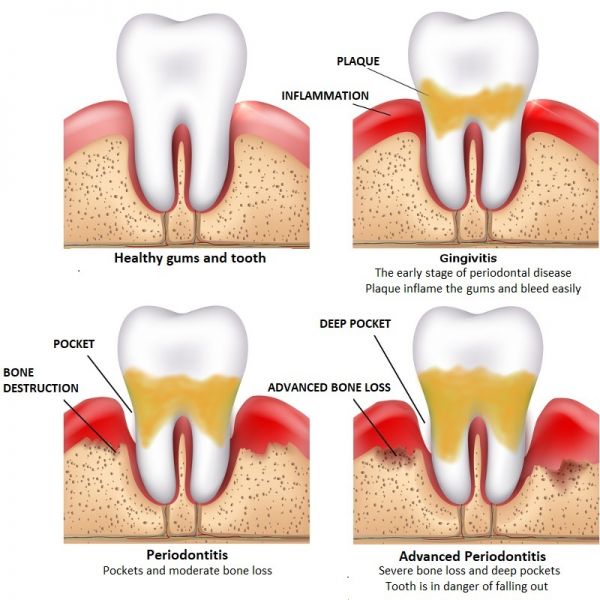PARODONTOLOGY
The main cause of periodontitis are bacteria that accumulate between the tooth and the gums and cause inflammatory diseases.
The precursor of periodontitis is the so-called gingivitis. It is curable through early treatment by a professional dental cleaning and oral hygiene education. Should this gingivitis be ignored and not treated, gradually a chronic periodontitis develops.
In the long term, chronic periodontitis leads to a decrease in gum tissue and destruction of the jawbone. The periodontal pockets deepen and the periodontal ligament is negatively affected. This chronic disease of the gums and bone, which initially begins unnoticed with bleeding gums and bad breath, leads untreated long-term tooth loss.
Every second in Germany suffers from a periodontitis disease, with different forms and advanced stages.
The disease increases with increasing age and adversely affects the entire organism. The bacteria in the mouth reach the bloodstream via the inflamed gums and from there into the whole body.
Among other things, chronic periodontitis increases the risk of suffering a heart attack or stroke.
Since periodontal disease is caused by different types of bacteria, we can use a DNA germination test to determine which bacteria can be treated with medication.
You should consult our practice as soon as the typical symptoms of periodontitis occur:
- Swelling and redness as well as increased sensitivity to the gums
- Bleeding while brushing your teeth
- Exposed, sensitive cervicals
- Extremely heat- and cold-sensitive teeth
- Bad breath (halitosis) and / or bad taste
- Loose teeth
Note: A sick patient is at high risk of transmitting the harmful bacteria to the life partner, as periodontitis is an infectious disease. If a disease has been diagnosed, the partner should be examined as well, if only to avoid endangering the therapy by a "re-infection". Contagion is also possible from mother to child.
Various factors influence the negative development of periodontitis, including smoking, improper diet, the use of certain medications or even hormonal disorders such as pregnancy periodontitis.
Our specially trained prophylactic assistants work in close cooperation with our dentists and only an intensive exchange of all involved persons, including patients, ensures the best treatment success.
Only individual therapies help against gum disease, which only lead to success if tightly scheduled follow-up appointments and regular professional teeth cleaning appointments are adhered to.
It is essential that the therapeutic result is sustainably secured after every successful treatment. In addition, our patients are embedded in a recall system that ensures long-term oral health through regular prophylaxis sessions. This way any recurrences can be detected early.
Do you have further questions about periodontitis? Talk to us in the dental practice.




